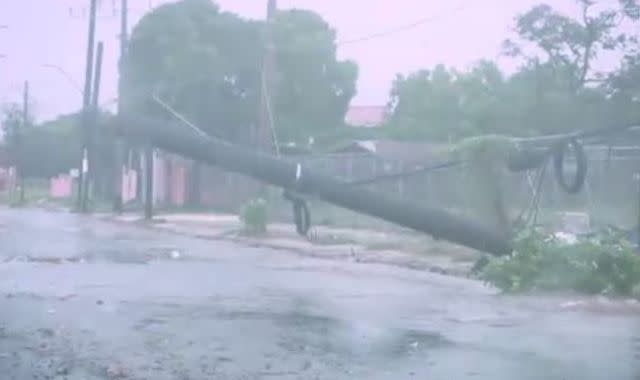Hurricane Beryl: Jamaica hit by powerful storm

On a waterlogged road in Kingston, Jamaica's capital city, a mural on the wall depicts rain clouds containing three words: "Grace", "Mercy", and "Forgiveness".
Over the past few days, Hurricane Beryl has shown little of any, leaving entire islands in ruins and killing several people.
Jamaicans had watched how the devastating winds and storm surge bulldozed the eastern Caribbean and were braced for the worst.
In the end it delivered more of a glancing blow than a direct hit, but those who lived through this hurricane won't forget it any time soon.
"I was scared," says Peter Williams, a fisherman. "We all were. It was terrible, there were buildings tearing down. I've seen storms like this in September, but never in July."
Hurricane Beryl is the most powerful storm ever to make landfall this early in the season. It intensified at a lightning pace, morphing from a tropical depression to a category five hurricane in just three days.
"The wind was wicked," says Kirk White, from Spanish Town. "Really wicked. I saw roofs being torn off houses and trees being tossed into the road. I'm worried because this storm happened so early and got so big so quick."
The worst affected areas were along the island's southern coast where a storm surge flooded houses, leaving roads impassable.
The first confirmed death in Jamaica because of the storm was a woman killed in the western parish of Hanover, as a tree fell on her house.
In Portmore, a beachside community close to the capital city, boats had been washed up, roofs ripped clean off and debris strewn across the road.
But Angela Wilson was grateful that everyone she knew had made it through relatively unscathed.
"We're all alive. Nobody got hurt and that is the greatest, and for that thanks to the almighty," she said.
Much of the island was left without power overnight and petrol stations remain shut.
At Kingston's Norman Manley International Airport, part of the roof of the main terminal was peeled off by the swirling wind.
Climate scientists believe sea temperatures two or three degrees warmer than normal are to blame for an increase in the intensification of deadly storms.
Sheldon Mackinson, a fisherman from Hellshire Beach, was taking cover from the rain in a tin roof building with a sleeping bag on a concrete floor, so he could remain close to his boat.
He believes climate change is contributing to the damage being wrought by Hurricane Beryl.
Read more:
Why was Beryl so intense and so early?
He said: "I don't think it's nature. I think it's the bigger guys playing with the globe because we never have a storm in this month. I think there's some messing up going on with the weather."


